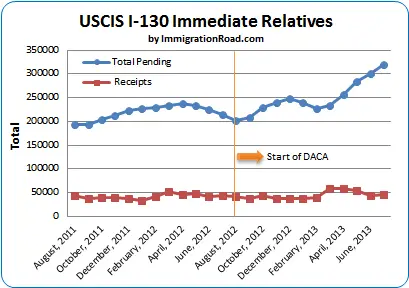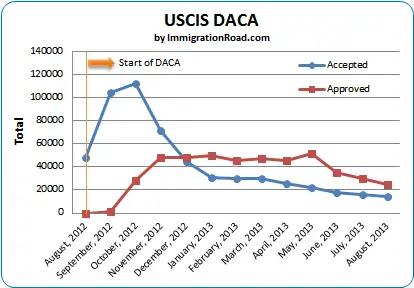Recently many I-130 petitioners have received a USCIS letter stating that their case would be further delayed by about six months. The letter also says the delay is caused by workload factors not related to their case. A reader suggested DACA (Deferred Action for Childhood Arrivals) as the reason, so I dug up some data published by USCIS. Since the start of DACA in August, 2012, the total number of pending I-130 petitions has jumped from 208K to 320K, a 60% increase. This number only includes immediate relatives of U.S. citizens and new filings for the same period of time have remained steady.
Below is the pending I-130 data for immediate relatives of U.S. citizens, published by USCIS:
On the other hand, more than 500,000 DACA applications have been processed relatively quickly, especially when compared to typical USCIS processing times.
Although this data point is hardly conclusive, it does suggest that USCIS may have pulled a considerable amount of resources away from handling regular immigration cases. It is possible that USCIS had no other choice, considering the surge of DACA applications last Summer. In addition, DACA was implemented under an executive order, rather than a new law passed by Congress, so it probably left USCIS very little time to get ready. What is unclear is whether USCIS was also ordered to assign top priority to DACA cases, at the cost of others that have already been waiting in line.
What is more, DACA is valid for two years and renewable. If Comprehensive Immigration Reform (CIR) doesn’t pass, it means that every two years there will be a rush of DACA applications and the temporary delay of processing other cases could very well become permanent.
For people not familiar with immigration issues, I-130 is the only way a U.S. citizen can bring an immediate relative – such as a spouse, parents or children – to live in the U.S. as a permanent resident. DACA is a government policy to defer removal action and grant work authorization to certain people who came to the United States as children and meet several key guidelines.
DACA statistics:



